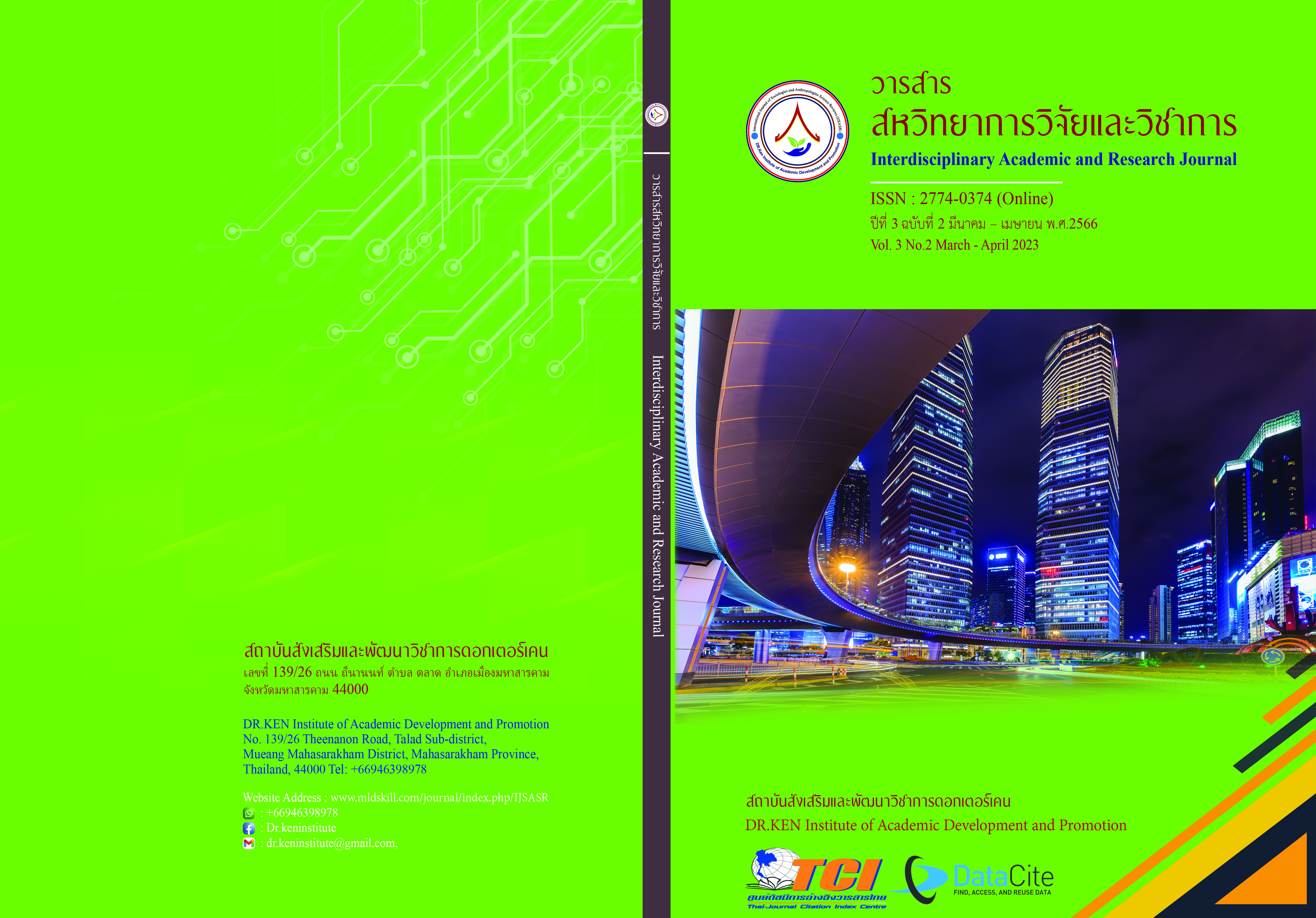The Development of Academic Achievement on The Thai Society Topic Through Learning Activities by Using Cooperative Learning Techniques with the STAD (Student Teams Achievement Divisions) Technique for Muttayomsuksa 3 students of Inburi School
DOI:
https://doi.org/10.14456/iarj.2023.53Keywords:
Learning activities by using cooperative learning techniques; , Academic Achievement; , SatisfactionAbstract
Student Teams-Achievement Divisions is a group process of learning by dividing students with different abilities to help working each other and brainstorm. Everyone plays a part in the team's success. These enable students to achieve, collaborate, be encouraged, and be intelligent, virtuous, and happy. The research aimed to the development of academic achievement and satisfaction of Muttayomsuksa 3 students of Inburi School based on the form of cooperative learning with the STAD (Student Teams Achievement Divisions) technique. The sample group used consisted of 23 Muttayomsuksa 3/3 students of Inburi School in the first semester of 2022 obtained by using the classroom as the random sampling unit. The instruments used were 13 plans of learning management, the academic achievement assessment test of 30 items, and satisfaction questionnaires of 20 items. The statistics used consisted of mean, standard deviation, and t-test. The results of the research indicated that the level of students' academic achievement based on cooperative learning techniques with the STAD (Student Teams Achievement Divisions) technique after the study was higher than the one of the pre-studies with statistical significance at the level of .05. Moreover, students' satisfaction was at the highest level.
References
กระทรวงศึกษาธิการ. (2553). หลักสูตรแกนกลางการศึกษาขั้นพื้นฐาน พุทธศักราช 2551 (พิมพ์ครั้งที่ 3).กรุงเทพฯ: โรงพิมพ์ชุมนุม สหกรณ์การเกษตรแห่งประเทศไทย จำกัด.
กุลยา กอศรีพร, และกมลวรรณ แหวนประดับ. (2563). “การพัฒนาผลสัมฤทธิ์ทางการเรียน เรื่อง พัฒนาการของภูมิภาคเอเชียตะวันออกเฉียงใต้ของนักเรียนชั้นมัธยมศึกษาปีที่ 1 โดยใช้การจัดการเรียนรู้ แบบร่วมมือด้วยเทคนิค STAD”. EDUCATIONJOURNAL. 3(1), 13-23.
ต่อศักดิ์ บุญพิมล. (2559). การพัฒนาผลสัมฤทธิ์ทางการเรียน โดยใช้แบบเรียนรู้แบบร่วมมือโดยใช้เทคนิค STAD ร่วมกับหนังสืออ่านเพิ่มเติมชั้นประถมศึกษาปีที่ 4 เรื่องพระพุทธศาสนา กลุ่มสาระการเรียนรู้สังคมศึกษาศาสนา และวัฒนธรรม. มหาสารคาม: มหาวิทยาลัยราชภัฏมหาสารคาม.
ทิศนา แขมมณี. (2559). ศาสตร์การสอน: องค์ความรู้เพื่อการจัดกระบวนการเรียนที่มีประสิทธิภาพ (พิมพ์ครั้งที่ 20). กรุงเทพฯ: จุฬาลงกรณ์มหาวิทยาลัย.
น้ำพลอย โพธิ์ขวัญ, ปริญญา ทองสอน, และศริประภา พฤทธิกุล. (2562). “ผลสัมฤทธิ์ทางการเรียนวิชาประวัติศาสตร์ โดยใช้รูปแบบการเรียนแบบร่วมมือ เทคนิค STAD ร่วมกับวิธีการทางประวัติศาสตร์ของนักเรียนชั้นประถมศึกษาปีที่ 6”. วารสารครุพิบูล. 7(1), 26-36.
บุญชม ศรีสะอาด. (2560). การวิจัยเบื้องต้น (พิมพ์ครั้งที่ 10). กรุงเทพฯ: สุวีริยาสาส์น.
ปาริชาติ สมใจ.(2549).การพัฒนาผลการเรียนรู้เรื่องโจทย์ปัญหาของนักเรียนชั้นประถมศึกษาปีที่3 โดยจัดการเรียนรู้แบบร่วมมือกันเทคนิคกลุ่มผลสัมฤทธิ์(STAD)ร่วมกับเทคนิค KWDL. วิทยานิพนธ์ปริญญาโทมหาวิทยาลัยศิลปากร.
เลิศลักษณ์ กำลังเลิศ.(2558). การพัฒนาผลสัมฤทธิ์ทางการเรียน เรื่อง คำควบกล้ำ ร ล ว ของนักเรียนชั้นประถมที่ศึกษาปีที่ 5 โดยใช้กิจกรรมการเรียนรู้แบบร่วมมือด้วยเทคนิค STAD ประกอบการฝึกเสริมทักษะ. วิทยานิพนธ์ปริญญาโท มหาวิทยาลัยราชภัฏมหาสารคาม.
สมศักดิ์ เวชแดง. (2561). การพัฒนาผลสัมฤทธิ์ทางการเรียนรายวิชาสังคมศึกษา ศาสนาและวัฒนธรรม ของนักเรียนชั้นมัธยมศึกษาปีที่ 1 โรงเรียนไชยาวิทยา โดยใช้กิจกรรมการเรียนรู้แบบร่วมมือรูปแบบSTAD. วิทยานิพนธ์ปริญญาโท มหาวิทยาลัยราชภัฏสุราษฎร์ธานี.
สรรยา ศรีไชย, ทัชชวัฒน์ เหล่าสุวรรณ, และประภัสสร ปรีเอี่ยม. (2564). “การพัฒนากิจกรรมการเรียนรู้ แบบร่วมมือเทคนิค STAD เรื่องอาณาจักรอยุธยาและธนบุรี ชั้นประถมศึกษาปีที่ 5”. วารสารมหาวิทยาลัยราชภัฏมหาสารคาม. 15(3), 121-130.
สุดารัตน์ เที่ยงไทสง. (2561). ภาพสะท้อนของปัญหาสังคมไทยในยุคดิจิทัลที่ปรากฏในงานเขียนเชิงสารคดีท่องเที่ยวของนิ้วกลม. วิทยานิพนธ์ปริญญาโท มหาวิทยาลัยธุรกิจบัณฑิตย์.
อภินันท์ ศรีสุภาพ, และชนะชัย อวนวัง. (2565). การพัฒนากิจกรรมการเรียนรู้แบบกลุ่มร่วมมือเทคนิค STAD เรื่อง พลเมืองดีตามวิถีประชาธิปไตยกลุ่มสาระสังคมศึกษา ศาสนา และวัฒนธรรม ชั้นประถมศึกษาปีที่ 4. วารสารสังคมศาสตร์เพื่อการพัฒนาท้องถิ่น มหาวิทยาลัยราชภัฏมหาสารคาม. 6(3), 155-161.
Cronbach, L. J. (1970). Essentials of Psychological Test. 5th edition. New York: Harper Collins.
Kuder, Frederic G., and M.W. Richardson. (1937). “The Theory of the Estimation of Test Reliability”, Psychometrika, 2(September), 151-160.
Maslow, Abraham. H. (1970). Motivation and Personality. New York: Harpers and Row.
Slavin, E., Robert. (1995). Cooperative Learning: Theory, Research and Practice. 4th edition. Allyn and Bacon, Boston.
Slavin, R.E. (1987). “Cooperative learning and Cooperative School”. Educational Leadership, 45(3), 7-13.
Slavin, R.E. (1990). Co-operative Learning: Theory, Research and Practice. Prentice Hall, Englewood Cliffs.
Suyanto, W. (1999). The effects of student teams’ achievement division on mathematics. New York: McGraw-Hill Book.
Downloads
Published
How to Cite
Issue
Section
License
Copyright (c) 2023 วีรวิชญ์ บุญส่ง, นรากรณ์ จูงาม, ยุพาพรรณ คงอยู่

This work is licensed under a Creative Commons Attribution-NonCommercial-NoDerivatives 4.0 International License.
Copyright on any article in the Interdisciplinary Academic and Research Journal is retained by the author(s) under the under the Creative Commons Attribution-NonCommercial-NoDerivatives 4.0 International License. Permission to use text, content, images, etc. of publication. Any user to read, download, copy, distribute, print, search, or link to the full texts of articles, crawl them for indexing, pass them as data to software, or use them for any other lawful purpose. But do not use it for commercial use or with the intent to benefit any business.
















.png)


